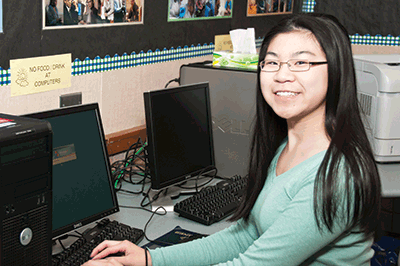Washington’s Legislature has cut funding for a program that over the past three years connected nearly 250 Clark County high school students with internships in local companies. But a team of nonprofits, school officials and business leaders are determined to keep the program going – and even to expand internship opportunities for teens across the county.
Internships have been successful at helping students develop professional skills and directing them toward careers in science, technology, engineering and mathematics (or STEM), so the Southwest Washington Workforce Development Council and its partners are seeking out new ways to nurture opportunities, said Jeanne Bennett, head of the SWWDC.
How it was
Since 2010, Vancouver nonprofit nConnect has been connecting students at local high schools with internship opportunities throughout the region.
Initially with federal funds that the SWWDC received and passed along, and then later with state funding also channeled through SWWDC, nConnect program manager Manlio Castillo reached out to businesses to identify opportunities for high school students. He then contacted guidance counselors and teachers to find students to apply for those internships.
Funding rules limited participation to students of limited financial means – they had to be eligible for free or reduced lunch. After serving 90 hours as interns, students would receive a $500 stipend for their work.
“Sometimes kids that come from higher income backgrounds, their parents know how to work the systems and help them get experiences,” Bennett said. “We come in and help families that don’t have that resource.”
While they had to show aptitude for the work they would do as interns, they did not have to be academic superstars. Even students with so-so grades have shown they can excel in internships when they are engaged, Castillo said.
By all accounts, the program was a success for students and businesses alike.
For example, Student interns at Frito Lay in Vancouver learned to program machines used in manufacturing, and were able to make changes that reduced waste and saved the company hundreds of thousands of dollars per year, Castillo said.
A student at another workplace said his internship helped him set career goals and apply for college.
“I definitely got a good look at what work in the environmental field is,” said Jesse Barr, a former environmental science intern at the Vancouver Water Resources Education Center, who enrolled at the University of Washington last fall. “I think my internship strengthened my application to UW and a number of scholarships.”
Other former interns have landed jobs right out of high school.
“It’s very valuable for youth to have work experience, to come to work dressed correctly every day, to respond to the boss appropriately,” Bennett said. But this is just one component of what high schoolers learn by taking on internships.
“We also want students to understand skills and know what skills they need,” she said, “So they can say, ‘Oh, I can do this career, if I take calculus.’”
What comes next
With state funding gone since June, the internships that nConnect coordinates no longer come with a guaranteed $500 stipend. The nonprofit also no longer limits interns to those from low-income homes, which it had been required to do under terms of its previous funding.
Without more money, Castillo said he expects to place fewer interns next academic year. However, he’s still determined to offer high-quality work placements where he can.
“We have a Plan A, a Plan B, a Plan C,” Castillo said. “We are certainly hoping to continue our work.”
Castillo is now asking businesses to chip in to support administrative costs of running his program – and letting them know that they may, optionally, choose to pay student interns when the work is done.
The SWWDC wants to keep supporting nConnect’s efforts, and is also trying to better coordinate a number of other internship programs in the region – including one run by Educational Service District 112, and another that put Evergreen Public Schools students to work at SEH America. These groups have been working together for the past half year, joined by the Vancouver School District, Columbia River Economic Development Council and others, to draw up a plan for promoting STEM-focused internships in Southwest Washington.
“We are trying to create an internship umbrella,” Bennett said. “We’ll be able to say, ‘These are the components of a successful internship program, and any organization that wants to participate and receive our stamp of approval needs to meet our standards.’ Then each separate organization – such as Camas schools, Evergreen schools, nConnect, Boys and Girls Club, whoever else gets involved, will be able to run internships independently, while following these standards.”
Evergreen is the first organization slated to get the STEM network stamp of approval, beginning this coming September, with Vancouver and Camas likely to follow soon, Bennett said.
“Our role is to convene and coordinate, not to run programs,” Bennett said. “What we try to do is make sure these programs are happening”




